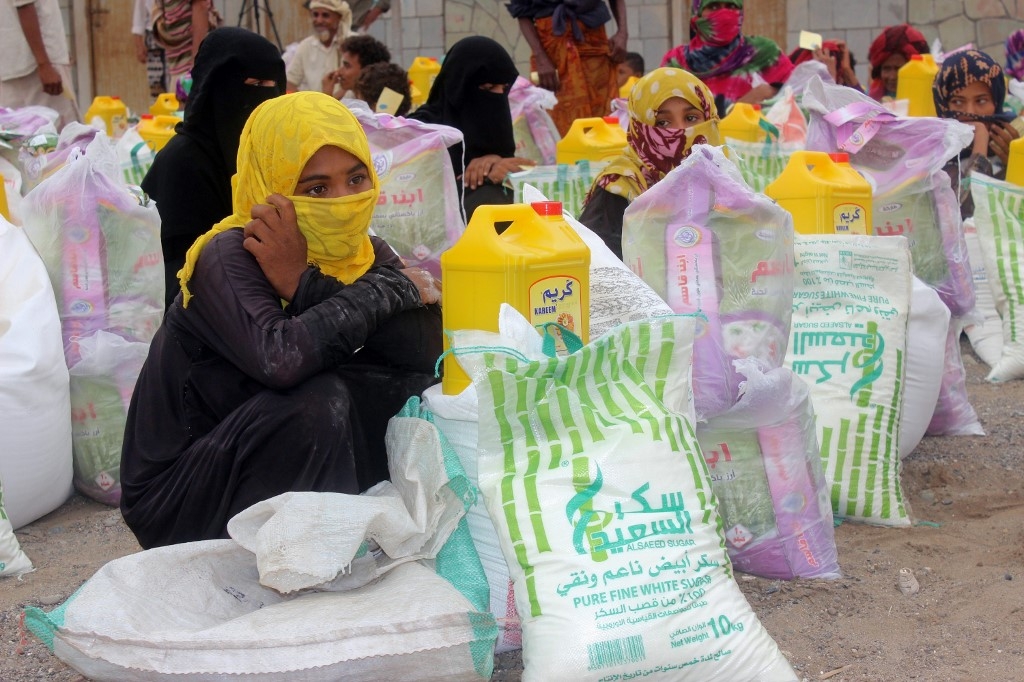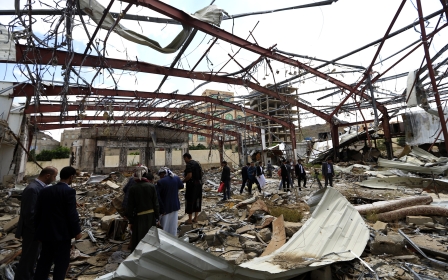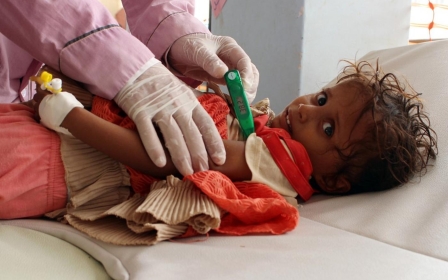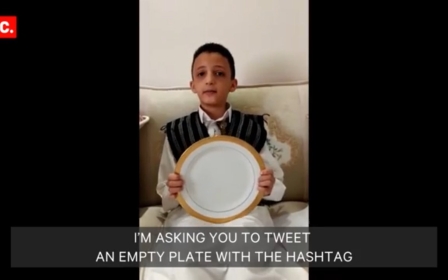Yemen's lifeline threatened by attacks on aid groups

After almost five years of war, millions of Yemenis have become reliant on aid for survival, but they now fear they'll be cut off from this crucial lifeline after attacks on international aid groups operating in their country.
A number of international non-governmental organisations (INGOs) have suspended their work in Al-Dhale’e region after their offices were attacked with rocket-propelled grenades over the weekend.
The attacks in southwest Yemen follow a campaign carried out against the aid groups, accusing them of being "enemies of Islam" and using their work as a front for missionary work.
Fahd, a teacher who preferred not to use his real name, told Middle East Eye that they heard explosions on both Saturday and Sunday and later found out that the offices of several aid organisations were hit.
The unknown armed men attacked offices of Oxfam, Mercy Corps, International Rescue Committee (IRC), ACTED and Haya Center, forcing all INGOs in Al-Dhale’e to suspend operations.
New MEE newsletter: Jerusalem Dispatch
Sign up to get the latest insights and analysis on Israel-Palestine, alongside Turkey Unpacked and other MEE newsletters
“These organisations came to reduce our suffering, but some silly people attacked them and now needy people will not find anyone to help them,” said Fahd.
“I hope that authorities in Al-Dhale’e arrest attackers and save the province to help INGOs to resume their activities.”
An estimated 80 percent of Yemen's population - 24 million people - require some form of humanitarian or protection assistance, and many of them are reliant on it.
According to the UN, at least 12 organisations have suspended their operations and told their staff to stay at home, a move that affects more than 200,000 local residents.
"We are extremely concerned for the safety of our staff who live and work in this area," said Salma Ben Aissa, Yemen Deputy Director of Programmes at the IRC.
"Those who will suffer the most are innocent Yemenis who benefit from IRC’s critical health, protection and education work in this area," he added.
Agitation against aid groups
Though the identities of the attackers are unknown, Fahd said he believed the attacks were a product of a recent campaign against aid groups, accusing them of being anti-Islam.
He said the sermons delivered by religious hardliners during Friday prayers had begun to accuse the groups of trying to convert Muslims to Christianity and subvert Yemeni cultural and moral values.
“It was the first time that preachers talked about this issue, but after the prayer I felt that some people believed in the opinion of the preacher,” Fahd said. “However many others did not, as we have felt the effects of these organisations during the last four years.”
No one has claimed responsibility for the weekend attacks yet, and the security forces did not arrest anyone for investigation.
Employees at one of the international organisations, who did not want to be named for their safety, told MEE that they had also faced challenges from tribes concerned with preserving conservative traditions.
“Some tribes in Al-Dhale’e accuse the aid workers of being missionaries and they believe that we break Yemeni taboos in our dealing with women and in other issues," they said.
“The authorities cannot face those tribes to save the aid workers, so we resorted to fleeing to Aden and only some who are originally from Al-Dhale’e remained there.”
They said their organisation would not return to Al-Dhale'e until authorities could guarantee safety for the aid workers.
The Emirati-backed Southern Transitional Council (STC) controls most of Al-Dhale’e province and the attacks took place in areas under its control.
Pro-STC officer Ahmed Muthana told MEE that they are against the attacks and have been investigating them.
“We cannot deny the role of these organisations and the majority in Al-Dhale’e support their work, but there were some people trying to create chaos in the province,” said Muthana.
Yemen fell into turmoil in 2015 when Saudi Arabia and the United Arab Emirates launched a bombing campaign against the country's Houthi rebels, who had overrun the capital Sanaa and ousted President Abd Rabbuh Mansour Hadi, who is backed by Riyadh.
The conflict has killed tens of thousands of people, caused outbreaks of preventable diseases and brought the country to the verge of famine.
The United Nations has said the humanitarian crisis in Yemen is the "worst in the world".
Middle East Eye delivers independent and unrivalled coverage and analysis of the Middle East, North Africa and beyond. To learn more about republishing this content and the associated fees, please fill out this form. More about MEE can be found here.




